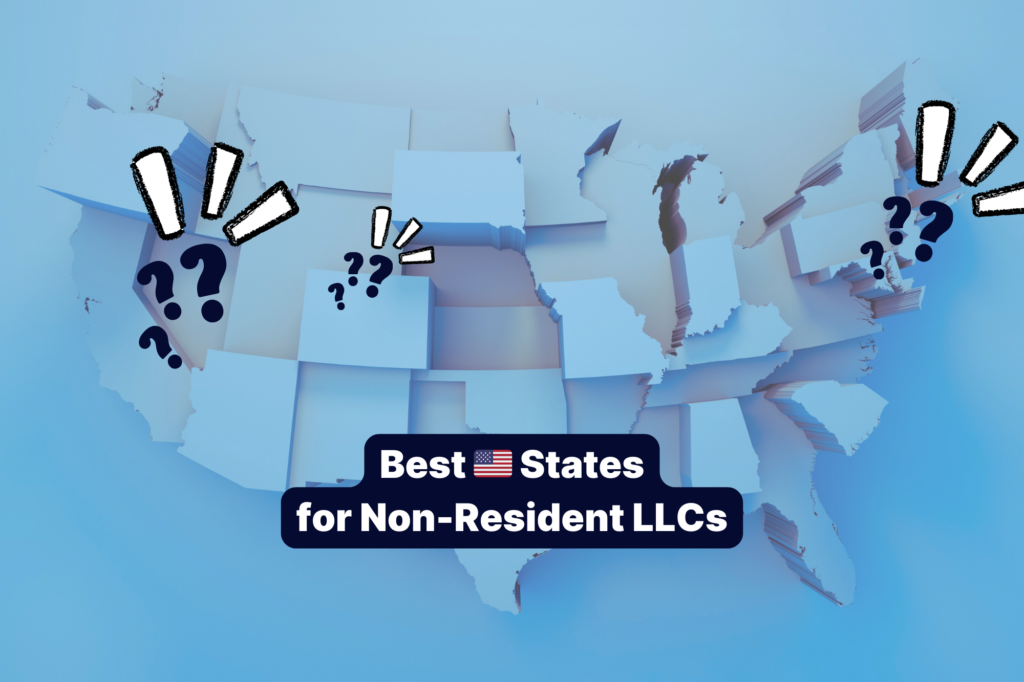For non-residents, forming a Limited Liability Company (LLC) in the United States offers numerous business benefits, including access to the US market, limited liability protection, and tax flexibility.
Setting up an LLC in the USA can be completed remotely, and this guide covers the essential steps, considerations, and tips for forming an LLC as a non-resident smoothly.
Benefits of Forming a USA LLC as a Non-Resident
Before diving into the steps, it’s essential to understand why non-residents form LLCs in the USA:
- Limited Liability Protection: Your personal assets are protected from business liabilities.
- Tax Flexibility: You may benefit from potential tax advantages based on your country of residence.
- No Residency Requirement: You don’t need to reside in the US to form and operate an LLC.
- Access to the US Market: Establishing an LLC allows you to expand your business presence in one of the world’s largest economies.
Step-by-Step Guide to Forming a USA LLC as a Non-Resident
1. Choose the Right State for Your LLC
The first step in forming your LLC is choosing the right state to register your business.
However, some business owners choose to form their LLCs in states like Delaware, Wyoming, or Nevada, even if they don’t live or operate there. These states are known for their business-friendly laws, low fees, and strong privacy protections. For a detailed comparison, you can refer to our guide on the best states to form an LLC for non-residents.
For example, Delaware is popular among larger businesses because of its well-established legal system and favorable corporate laws. Small businesses often prefer Wyoming for its low filing fees and strong asset protection laws, while Nevada is known for not having a state income tax.
Before choosing a state, consider factors like taxes, filing fees, and the specific laws that may impact your business. If you’re unsure, consulting with a legal or financial advisor can help you determine the best state for your LLC.
2. Select a Name for Your LLC
Choosing the right name for your LLC is more important than you think. Your business name is the first impression customers will have, and it’s essential that it reflects the nature of your business while being unique and compliant with state regulations. For more detailed insights on selecting a corporation name, you might find this blog post on choosing a corporation name useful.
Start by brainstorming names representing your business’s core values, products, or services. It’s important to check the availability of your chosen name on your state’s Secretary of State website. This step is crucial because you must return to the drawing board if your name is already taken.
In addition to being unique, your LLC’s name must indicate its legal status, such as ‘LLC,’ ‘L.L.C.,’ or ‘Limited Liability Company.’ This designation is not just a legal requirement; it also communicates to your clients and customers that your business has limited liability protections.
Once you’ve settled on a name, consider securing the domain name for your business website as well, even if you’re not planning to launch the website immediately. This ensures that your brand is consistent across all platforms.
3. Appoint a Registered Agent
After you’ve selected your LLC’s name, the next step is appointing a registered agent. A registered agent is a person or entity responsible for receiving legal documents on behalf of your LLC. These documents can include lawsuits, subpoenas, and official government correspondence.
Your registered agent must have a physical address in the state where your LLC is registered and be available during normal business hours. This requirement ensures that any important legal documents are received in a timely manner.
Appointing a reliable registered agent is crucial because missing a legal document could have serious consequences, such as default judgments or fines. It’s a small but critical step in protecting your business.
Please note that this is your agent’s address, not your company’s. Use a separate, unique address specific to your business for any commercial activities.
4. File Your Articles of Organization
The Articles of Organization is the document that officially forms your LLC. This document, sometimes called a Certificate of Formation or Certificate of Organization in some states, contains essential information about your LLC, including its name, address, and the name and address of your registered agent.
Filing the Articles of Organization is a straightforward process, but ensuring all the details are accurate is important. Inaccurate or incomplete information can delay the formation of your LLC or even result in the rejection of your application. If you need to make changes after filing, you may need to submit an Amendment to Articles of Organization.
Each state has its filing requirements and fees, so it’s important to check your state’s specific guidelines. Some states allow you to file online, while others may require mail-in forms. Typically, the filing fees range from $50 to $500, depending on the state.
After you file, the state will review your Articles of Organization. Once approved, your LLC is officially formed, and you’ll receive a certificate of formation. This certificate proves that your LLC exists and is in good standing with the state. Keep this document safe, as you’ll need it for various business activities, like opening a bank account or applying for business licenses.
5. Create an Operating Agreement
An Operating Agreement is an internal document outlining your LLC’s ownership and operating procedures. While not required in every state, creating an Operating Agreement is highly recommended, even if you’re the sole owner of the LLC.
For multi-member LLCs, the Operating Agreement is particularly crucial. It details how decisions are made, how profits and losses are shared, and the roles and responsibilities of each member. This clarity can help prevent misunderstandings and disputes down the road.
The Operating Agreement should cover key areas such as member contributions, management structure, voting rights, and procedures for adding or removing members. It also typically includes provisions for what happens if the LLC is dissolved.
Even single-member LLCs benefit from having an Operating Agreement. It helps reinforce the separation between your personal and business assets, essential for maintaining your LLC’s liability protection.
It’s a good idea to consult a legal professional to ensure your agreement is thorough and tailored to your needs.
6. Obtain an Employer Identification Number (EIN)
An Employer Identification Number (EIN) is a nine-digit number issued by the IRS that identifies your business for tax purposes. Think of it as a Social Security number for your LLC.
Obtaining an EIN is a necessary step if you plan to hire employees, open a business bank account, or file taxes. Even if you’re a single-member LLC with no employees, you might still need an EIN to separate your personal and business finances.
Once you have your EIN, keep it secure. You’ll need it for various business transactions, including tax filings, opening a bank account, and applying for business credit.
7. Open a US Business Bank Account
Separating your business and personal finances is one of the most important steps you can take to protect your personal assets. Setting up a dedicated business bank account for your LLC is crucial for maintaining this separation. If you’re unsure how to proceed, you can refer to our detailed guide on how to open a bank account in the United States.
When you open a business bank account, you must provide your EIN, your LLC’s Articles of Organization, and possibly your Operating Agreement. Having these documents ready will make the process smoother.
A business bank account helps keep your finances organized and simplifies tax preparation. It also makes your business appear more professional to customers and creditors, who may be more likely to do business with you when they see that you operate a legitimate, separate business entity.
Keeping your business finances separate also helps maintain your LLC’s limited liability status. Mixing personal and business finances can lead to what’s known as ‘piercing the corporate veil,’ which could expose your personal assets to liability in the event of a lawsuit.
8. File a BOI Report with FinCEN
The Corporate Transparency Act, which aims to combat financial crimes, requires certain LLCs to file a Beneficial Ownership Information (BOI) report with the Financial Crimes Enforcement Network (FinCEN). This report discloses the beneficial owners of the LLC, meaning individuals who own or control at least 25% of the company.
Filing a BOI report is mandatory for most new LLCs, and it’s important to understand the requirements and deadlines to stay compliant. Failure to file the BOI report or providing false information can result in severe penalties, including fines and criminal charges.
The BOI report includes details such as the full legal names, dates of birth, addresses, and unique identifying numbers (like a passport number) of the beneficial owners. It’s a good practice to keep this information up to date, as changes to ownership must be reported.
Understanding the exemptions and requirements for your LLC is critical to staying compliant with the law. If you’re unsure whether you need to file a BOI report, consult with a legal or financial professional who can provide guidance based on your specific situation.
9. Keep Your LLC’s Good Standing
Forming your LLC is just the beginning. You must stay on top of ongoing compliance requirements to keep your LLC in good standing. These typically include filing annual reports, paying state fees, and keeping your business licenses current.
Each state has its requirements for LLCs, so it’s important to know what’s expected in your state. Missing a filing deadline or failing to pay required fees can result in penalties or even the dissolution of your LLC. For more information on maintaining your LLC’s good standing, you can refer to our Certificate of Good Standing page.
By staying on top of these requirements, you can keep your LLC in good standing and focus on growing your business without worrying about compliance issues.
FAQs on Forming a USA LLC as a Non-Resident
- Can I form a US LLC if I don’t live in the US?
Yes, you can form and operate an LLC in the US without residing there. All communication can be handled online, and services like registered agents make it easy to manage compliance remotely. - Do I need a visa to form an LLC in the US?
No, forming an LLC does not require a visa or physical presence in the US. - What are the ongoing costs of maintaining an LLC as a non-resident?
Ongoing costs include registered agent fees, state annual report filing fees, and any taxes or accounting services your LLC may require.
Conclusion:
Forming a USA LLC as a non-resident provides numerous opportunities for expanding your business globally. While the process may seem overwhelming, following these steps will ensure that your LLC is established correctly and that you remain compliant with US regulations.
By choosing the right state, appointing a reliable registered agent, and maintaining your LLC’s good standing, you can enjoy the benefits of doing business in the US, even as a non-resident.
At the end of the process, remember to explore Clemta, which simplifies the entire formation process and offer ongoing compliance support for non-resident entrepreneurs. Clemta provides a user-friendly platform to help you manage all aspects of your LLC—from formation to tax filing and more. Sign up for Clemta today to streamline your LLC formation and ensure seamless ongoing compliance.







